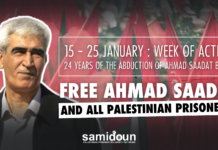The following statement was released by Palestinians for Dignity for their Tuesday, Oct. 2 5 pm protest in Ramallah demanding an end to political arrests:
demanding an end to political arrests:
“NO TO POLITICAL ARRESTS”
Join us at 5:00 pm at Manara Square in Ramallah
Our demonstartion today comes as a result of the wide campaign of arrests carried out by the Palestinian Security Forces (the Intelligence Services, the Preventive Security, and the Military Intelligence), which began on the evening of Wednesday, September 19, 2012, and continues to this day. According to statements released by a number of Palestinian human rights organizations (Addameer, the Palestinian Independent Commission for Human Rights, Al-Haq), the number of political arrests has topped 130. While some of those arrested have been released, more arrests have occured over the passed days, with the final number of those in detention still unknown. Some of those arrested have entered an open-ended hunger strike.
Although political arrests is a phenomenon that accompanied the establishment of the Palestinian Authority, over the rescent years it grew at a rapid pace. Under the pretext of division between Hamas and Fateh, the most basic human rights have been violated, namely the freedom to express one’s opinion and to engage in peaceful opposition to the governing regime.
PALESTINIANS FOR DIGNITY
—————————————-
What are political arrests?
When a person is imprisoned because of his/her opposition to the regime and/or political affiliation, or for sympathizing with opponents of the regime or rendering its oponents assistance; in other words, anyone who criticizes the performance of the Palestinian Authority or chooses to oppose it politically is at risk of arrest. In the current context, “normal” citizens and political activists are at equal risk of being subjected to political arrest. The number of people who were arrested as a result of recent arrest campaing are as follows:
Qalqilya – 24, Ramallah – 9, Salfit – 20, Jenin – 5, Hebron – 8, Bethlehem – 7, Jericho – 4, Tulkarem – 22, other areas – 22.
Additionally, between 10 and 20 people have been arrested in the Gaza Strip over the same period, with at least another 30 to 40 people who were arrested but later released.
How can we know that a certain arrest is political?
The authorities can claim that a person was arrested for reasons that have nothing to do with politics or with freedom of expression. This is usually claimed by the authorities to conceal its violations and find a legal excuse to restrain the freedom of political activists. For this reason, every person that has been arrested should be presented with the accusations against him/her, should be detained according to the law, and accordingly should be brought before a court with the presence of an attorney to defend him/her. However, what is happening today is far from these legally mandated proceedings. Palestinian human rights organizations have documented many cases that indicate arrests were carried out for political reasons, and that the proper legal proceedings were not followed, because, simply put, there is no law criminalizing any political affiliation or expressing opinions. Therefore, the arrest of any citizen because of his/her political affiliation with a Palestinian political party or because he/she expressed an opinion peacefully is considered a political arrest, and will continue to be considered as such even if other legal charges were fabricated.
News agencies have reported that the Palestinian security forces arrested newly released prisonors from Israeli jails, in addition to a number of journalists and youth activists, and these arrests are considered a violation of the Palestinian Basic Law.
Why are there political arrests?
All tyrannical authorities believe that when it arrests dissidents, activists, or even ordinary people,it causes the rest of the population to fear criticizing it, and therefore by just arresting 100 it will have effectively imprisoned the entire population with fear. In this way it will facilitate its control over the country. For this reason, the political detainee is often exposed to torture in prison. This has included shabah (hands bound behind back and legs tied), beatings, and prolonged sleep deprivation, according to human rights organizations.
Discover more from Samidoun: Palestinian Prisoner Solidarity Network
Subscribe to get the latest posts sent to your email.




